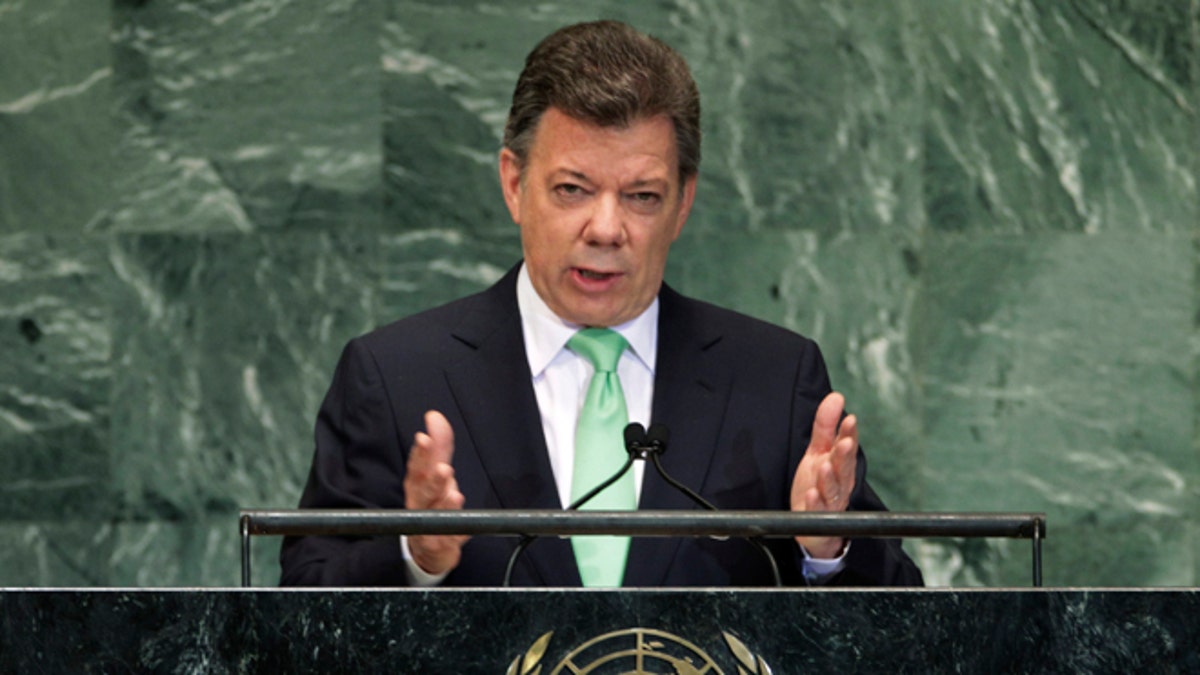
Colombian President Juan Manuel Santos Calderon addresses the 67th session of the United Nations General Assembly at U.N. headquarters Wednesday, Sept. 26, 2012. (AP Photo/Frank Franklin II) (AP2012)
New York – Colombian President Juan Manuel Santos lauded his administration’s security, foreign policy and economic successes over the last two years during an event Wednesday night following his address at the United Nations.
Speaking at the Council of the Americas, where he was honored with the organization's Gold Insignia Award, Santos said that Colombia currently has one of its lowest homicides rates in the past 35 years and kidnappings are at an all-time low. He also highlighted the death and capture of many top members of the leftist guerilla group, the Revolutionary Armed Forces of Colombia.
“The security situation in Colombia is continuing to improve,” Santos said. “The conditions are very fertile to start negotiations to end 50 years of war.”
The Colombian government and the FARC recently announced that they will hold joint peace talks in an effort to end the half century-long internal civil conflict that has seen 50,000 and 200,000 people killed and 2.4 million and 4 million people internally displaced.
Santos said that he was “cautiously optimistic” in the lead up to the talks that will formerly start on Oct. 8 in the Norwegian capital of Oslo.
I hope that next year when I come back to the council I can say there is peace in Colombia.
Recent negotiations, however, have not been cordial between the FARC and Colombian government. In 1999, failed peace talks during the administration of then-Colombian President Andrés Pastrana led to the country ceding Switzerland-size portion of land as a safe haven for the FARC, which the group used as a base to continue waging war elsewhere, extorting, kidnapping and drug trafficking.
The Colombian government has also denied a FARC-proposed ceasefire before the talks and it seems unlikely that the rebel demand to release one of their members held in the United States will be met. The denial of a ceasefire has meant a continuation of violence between the two combatants, with FARC-planted land mines killing five people last week and a Colombian military strike killing Danilo García, commander of the FARC's 33rd Front and one of the closest friends of the guerrilla group's top leader.
Both the Colombian government and the FARC are still confident that the peace talks will work out.
"These obstacles are nothing compared with all that has accumulated from ... 50 years of violence, which we are trying to solve through dialogue," Marco León Calarca of the FARC, told The Associated Press. "In that sense, looking at things optimistically, we think there is no problem we can't solve."
During his speech at the Council of the Americas, Santos – a regular speaker at the organization’s events – said that he would like to have the peace talks resolved by next year.
“I hope that next year when I come back to the council I can say there is peace in Colombia,” Santos said.
Santos also commended his government’s efforts to stabilize the touchy foreign policy issues that he inherited from his predecessor President Alvaro Uribe – especially in regards to neighboring Venezuela.
When Santos took office, Venezuela and Colombia along with Ecuador had no diplomatic relations following the 2008 Andean Diplomatic Crisis in which a Colombian raid on a FARC camp in Ecuador lead to Venezuelan troops being sent to the border with Colombia. That created an icy relationship between the once close trade partners.
One of Santos’ first actions in office was to meet with his Venezuelan counterpart, Hugo Chávez, and smooth out their differences. The crisis, however, was first resolved when a public reconciliation between the three countries took place in March of 2008 at the Rio Group summit.
“We normalized a situation that at the time was a bit absurd,” Santos said. “Even though we have very profound differences, I said let’s work things out.”
Santos is the second person in his family to receive the Gold Insignia award from the Council of the Americas. Seventy-two years ago, his great uncle Eduardo, a well-known newspaper published and who served as the country's president from 1938 to 1942, was given the honor by the organization’s predecessor, the Pan American Society.
